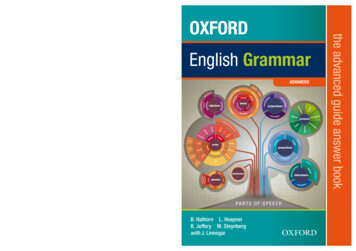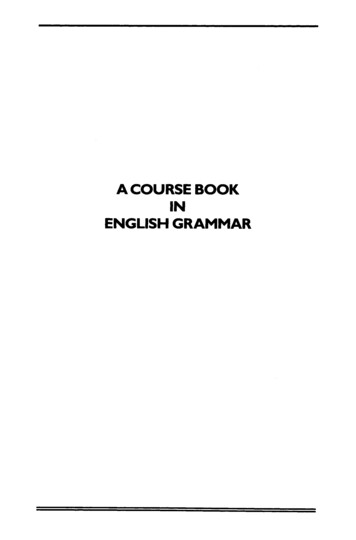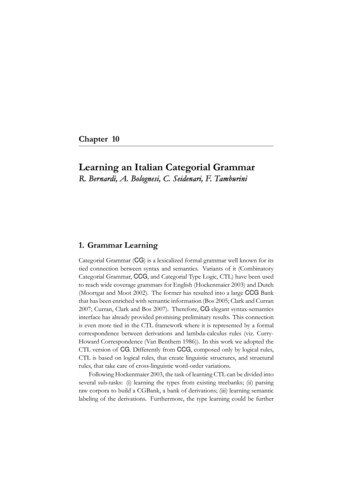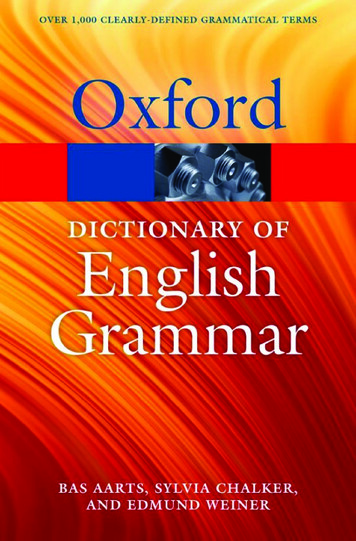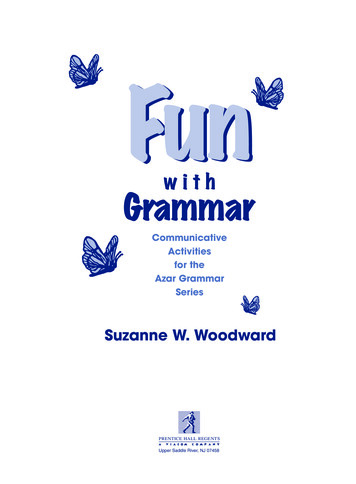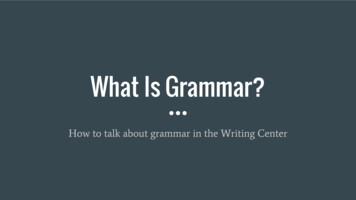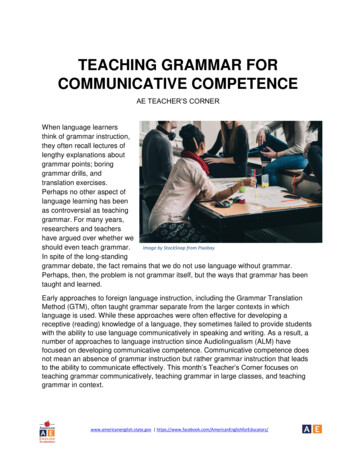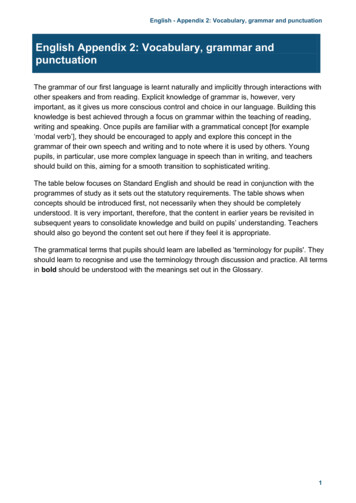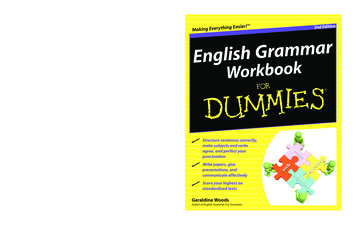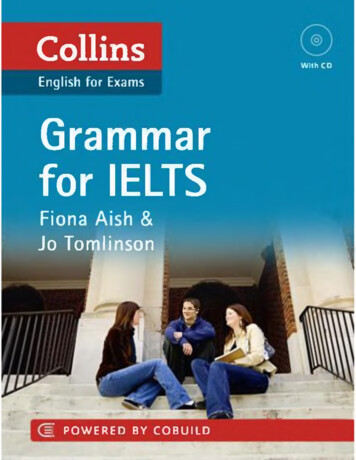
Transcription
CollinsW ith CDEnglish for ExamsGrammarfor IELTSFiona Aish &Jo Tomlinson\ L&11*.; P O W E R E D BY C O B U I L D ju t ; jB P H
ContentsUnit1O2TopicGrammarfocusHolidays andtravelFree nsesPresent sim ple,past sim ple andpresent perfectSpeakingPart 1W ritingTask 26ContinuoustensesPast continuous,present continuous,present perfectW ritingTask 1Reading10continuous3FamePastN arrative tenses:past perfect andused to/wouldReadingListeningSection 214EducationFuture 1Witt and going toListeningSection 1SpeakingPart 318The InternetFuture 2Present continuousfo r future and futureperfectListeningSection 2Reading22The familyWordorder andpunctuationSubject verb object andpunctuationW ritingTask 2SpeakingPart 2267TheenvironmentSubject/verbagreem entS ingular p lu ra lnouns/verbs anddeterm inersReadingW ritingTask 1308FoodCountable/uncountablenounsCountable anduncountable nounsSpeakingPart 2ListeningSection 1349Employmentand financeA rticlesUsing a, the or noarticleW ritingTask 1Reading3810YouthLinkingwords andsignpostingGiving additional,opposite,contrastinginform ationReadingListeningSection 442o 1 I14O5O6Oo*1 1*o
rPeople ucturesListeningSection 3SpeakingPart 146CrimeModals 1Present modalscan/may/should etc.SpeakingPart 3W ritingTask 250The planetModals 2Past m odal verbsListeningSection 3Reading54GlobalizationConditionalsZero, first,second and thirdconditionalsSpeakingPart 3W ritingTask 258Culture andmodernsocietyReportedspeechTense, tim e andpronoun changesReadingSpeakingPart 262Health andfitnessPronoun useUsing referencewords to maintaincohesion in w ritin gW ritingTask 2ListeningSection 26617FashionParagraphand textorganizationUnderstandinghow texts andparagraphs areorganizedReadingW ritingTask 17018Film andentertainm entThe passiveSimple passiveSpeakingPart 2ListeningSection 374W ildlifeRelativeclausesRelative clausesListeningSection 4SpeakingPart 378Men andwomenNoun phrasesConstruction ofnoun phrasesW ritingTask 2Reading82O12O13Q14O15O16OO19O20
Audio script86Answer key103Gram mar referenceUnit 11UUnit 2115Unit 3116Unit U117Unit 5118Unit 11119Unit U120Unit 15122Unit 18123IELTS information124
IntroductionWho is this book for?Grammar for IELTS w ill help improve your gram m atical knowledge fo r a ll four papers of theIELTS exam. As you know, gram m atical accuracy and range are part of the m arking crite ria forthe IELTS W riting and Speaking papers. Also, gram m atical accuracy is im portant in the IELTSListening and Reading papers. The book can be used fo r self-study or as supplem entary m a te ria lfo r IELTS preparation classes. It is suitable fo r learners at level 5.0-5.5 aim ing fo r band 6.0 orhigher.Sum m aryThe Grammar for IELTS book and CD cover gram m ar and skills which are relevant to a ll four exampapers: Listening, Reading, W riting and Speaking. Each unit begins with a gram m ar sectionpresenting the key gram m ar for the unit with example sentences and explanations. This gram m arsection is followed by exercises that help you develop the gram m atical knowledge and skillsneeded for the exam. At the end of each unit, there is an exam practice section which is modelledon the actual IELTS exam. Tips throughout the book highlight essential gram m ar-related learningstrategies and exam techniques.ContentUnitsEach unit is divided into three parts.The first part introduces key gram m ar using Collins COBUILD gra m m a r explanations andexample sentences.The second part, containing Practice exercises, provides a structured set of exercises which helpyou develop the s k ills to successfully apply gram m atical knowledge to the exam. The exercises area combination of traditional gram m ar exercises and exercises based on the IELTS exam.The third part, containing Exam practice, provides exam practice exercises in a form at thatfollow s the actual exam giving you the opportunity to fam iliarize yourself w ith the kinds ofquestions you w ill encounter in the exam. This section focuses on a p a rticula r exam paper and ishighlighted in grey fo r easy reference.Exam tipsThere are exam tips and strategies in each unit. These are in boxes fo r easy reference.Audio scriptA ll audio fo r the Listening and Speaking papers has been recorded on the CD using nativespeakers of English. A fu ll audio script, including m odel answers fo r the Speaking papers, isprovided at the back of the book so that you can check the language used in the listening andspeaking exercises, if needed.Answer keyA comprehensive answer key is provided fo r a ll sections of the book including m odel answers fo rmore open-ended w ritin g and speaking tasks.u
Gram m ar referenceThere is a detailed gra m m a r reference section at the back of the book where the form s of thegra m m a r points presented in the units are provided fo r your reference. There is a note in the unitte llin g you which page to refer to in the G ram m ar reference section.How to use this bookThe book is divided into 20 units. Each unit is self-contained so that you can study the units inany order. You can choose the unit you want to study e ith er by selecting the g ra m m a r you w ant tostudy or selecting which exam papers you w ant to practise. A s u b -s k ill is also practised in eachunit. As a result, only the units w ith practice on Speaking and Listening papers contain audio.The contents pages at the beginning of the book provide an overview of w hat is in each unit soyou can use this to choose which units you would like to study first. These pages also give youinform ation on which units contain audio.You w ill probably find it helpful to begin each unit by reading the g ra m m a r section in the firs tpart, then w orking through the exercises in preparation fo r the exam practice exercise at theend. Try to do the exam exercises w ithin the tim e lim it to give yourself realistic exam practice.Getting w e ll-in fo rm e d feedback on your w ritin g and speaking exam practice exercises would alsobe an advantage. However, if this is not possible, it is s till im portant to do the exercises in fu ll.Studying model answers can help you develop the ability to assess your own w ork. If possible,record yourself when speaking and listen carefully to your perform ance. Avoid m em orizingm odel answers for the W riting and Speaking papers. Rem em ber that in the actual exam, it isim portant to answer the question and not ju s t speak or w rite about the topic.As part of your fin a l preparation before the exam, you could re-read the exam tips in the boxes.This w ill rem ind you of the strategies fo r success in the exam.
1Holidays and travelP re se nt sim p le tense I Past s im p le tense I P resent p e rfe c t sim p le tenseSimple tensesPresent simple:1The present simple is used to talk about:Permanent situationsI w ork in the city but I live in the countryside.2Things which happen often or repeatedlyI visit my grandparents in Scotland everysummer.3UPast simple:The train to London leaves everv 30 m inutes.The past simple is used to talk about:Completed actions or events in the pastI visited the m useum s in New York.I saw some m onum ents on holiday.Actions or events that happened at a specific time in the past (when)Last month I went on holidav fo r 2 weeks.3Birds m iqrate in winter.TimetablesThe bus departs at 9.10.2People often send postcards from interestinaplaces.Facts of nature o r scienceTravelling by plane uses a lot of enerqy.1Rome is the capital of Italy.I travelled to Tokvo last year.Things which happened often or regularly in the pastWe always went on holidav to France when Iwas a child.Grammar for IELTSEverv su m m er I spent the school holidavsw ith my cousins.
Unit 1Present perfect simple:1The present perfect simple is used to talk about:Actions which started in the past and continue nowI've worked abroad fo r ten years.2Actions in the past when the time is not finished.I've visited many art galleries this year. (Thisyear is not finished)3He has lived in Germany since 2002.He has lived in a lot of different places in hislife. (His life is not finished)Recent events which are related to the presentW here’s my camera? Oh no, someone hasstolen it.Is Sarah having dinner w ith us? No, she hasgone back to the cam psite to rest. S e e page 114 in the G ram m ar reference fo r more inform ation.Practice exercisesDecide on the correct tense (present sim ple, past sim ple o r present perfect sim ple) andfinish the sentences. Decide which rule m atches the meaning of each sentence.1The sun o fte n in Morocco, [shine] Tense: Rule n u m b e r:2‘It's late. W h e re ?' [you/go] Tense: Rule n u m be r:3What tim e ? [the bus/leave) Tense: Rule n u m ber:U J o h n (go) to Finland last year, but h e [like] it. Tense:Rule num ber:5The w o r ld (see) a massive sh ift in tra n sp ort and tourism in the last decade.Tense: Rule n u m b e r:6Cruise s h ip s [cross] the A tlantic w ith the m ajority of people before a ir travelbecame so affordable. Tense: Rule n u m b e r:Exam tip: Practise listening to and saying the contracted form of some verbs, forexample: he has taken he's taken, I have been I've beenHolidays and travel7
2Below is a section of a candidate answ er from an IELTS essay task (W riting Task 2).Com plete the spaces w ith the correct tenses."Discuss the positive and negative effects of to u ris m on people and the environm ent.”Regarding the environm ent, tourism (1 ) (improve) people's understanding ofendangered species. P rior to mass tourism , many societies (2 ) (disregard}the natural life around them . However, due to tourism many countries (3 )[invest] in conservation program m es. Ecotourism is now a very popular and a lot of tourists(4 ) [visit] Africa, Asia and South Am erica and (5 ) [partake] inprojects which care fo r the environm ent. Although there are positive points, tourism(6 ) (a/so have] a large num ber of negative effects on the environm ent. These(7 ) (include] an increase in a ir pollution from plane travel, rubbish fromtourists in parks and on beaches and the destruction of many of the w orld's rain forests.There are advantages and disadvantages fo r people too. During the 1990s in manyparts of the w orld, such as Spain or Thailand, tourism (8 ) [bring] economicdevelopment and [9 ] (create] a range of new em ploym ent possibilities forlocal people. On the other hand, the results of this increase in tourism som etim es producenegative effects fo r populations. Often a new hotel o r resort (10) (destroy]tra d itio n a l jobs such as agriculture, fishing and crafts.3Read the fo llow ing dialogue and com plete the text w ith the correct fo rm of the presentsim ple, past sim ple o r present perfect sim ple. Use the verbs in the brackets.E xam iner: Where (1 ) [live]?N ikolas: I (2 ) [come] from Moscow. I (3 ) [live] there fo r 6 years. Myfam ily (4 ) [move] from the countryside when I was 12 years old.E xam iner: (5 ) s till (6 ) [live] w ith your family?Nikolas: Yes, I (7)-------------- [do], I (8) [live] with my parents and (9)(share)a room with my brother. My brother still (10) [go] to school. He is only 8 years old.E xam iner: (11) [like] Moscow?Nikolas: Yes, I (12) [love] Moscow. When I firs t (13) [arrive], I (14)(not like) it much because it was so different, but I (15) [grow] accustomed to it. Now, I(16)-------------- [know] my way around and (17) [have] lots of friends.E xam iner: How (18) [Moscow/change] recently?N ikolas: It (19)-------------- [become] more international, and more exciting. In the last fewyears, about ten new international restaurants (20) [open] in my area aloneand I often (21) (eaf) in them now w ith my friends. I (22) [have] lots ofinternational friends who (23) [come] to study at the University in Moscow, andwe often (24) [meet] in the evenings.Grammar for IELTS
GNow listen and check your answers to Exercise 3.01i Speaking exam tip: Try to answer the question the exam iner asks you, and give morei inform ation. Nikolas has talked about a change and then the result of that change.4Answer these questions yourself and try to give as much information as possible.1Where do you live ?2How long have you lived th e re ?3What do you like about your home to w n ?U What other countries have you visited ?5Where did you go on holiday last ye a r?6How often do you go to the seaside?Exam practice: Speaking Part 102L iste n to th e 5 q u e s tio n s on th e CD, and a n s w e r th e m as fu lly as p o ssib le. You w ill have30 se co nd s b e tw e e n q u e s tio n s to give y o u r a n s w e rs .Speaking exam tip: Try to m irro r the exam iner’s gram m ar in the firs t sentence of youranswer and use the contracted form in your answer where you can, e.g. ‘Have youlived.?’ - ' i ’ve lived.’ ‘Do you like.?' - ‘I like.' "' j03Now listen to Track 03 on the CD and the m odel answers given by the student. How were theybetter than or different from your answers?Holidays and travel
2Cl i m arreeumeP re se nt co n tin u o u s tense I Past co n tin u o u s tense I P re se nt p e rfe c t co n tin u o u s tenseContinuous tensesThe continuous tenses highlight the duration of the activity so that there is a focus on the activityin progress.Present continuous:1The present continuous is used to talk about:Something that is happening / in progress nowSome people are sitting on the grass and having a picnic.2Changes and developmentsThe num ber of Web users who shop online is increasing,3Temporary situationsMy friend is staying in a holiday camp.Past continuous:1The past continuous is used to talk about:Continuing past actions happening at the same time as another event.I was sw im m ing in the sea when the rain started.2Describing situations in the pastSome people were relaxing by the pool and others were playing tennis.3Temporary situations in the pastFor the firs t two days of my holiday I was staving w ith friends.Present perfect continuous:1The present perfect continuous is used to talk about:Actions that started in the past and are continuing nowMy best friend has been learning French since January.Grammar for IELTS
Unit 22When you mention the results of a recent activityI'm so tired. I’ve been w aiting for the train fo r hours.3When we want to emphasize the repetition or duration of an actionThey’ve been thinking about where to go this weekend.See page 115 in the G ram m ar reference fo r more inform ation.Practice exercisesDecide on the correct tense (present continuous, past continuous or present perfectcontinuous) and complete the sentences 1-6 using the verbs in the brackets. Decidewhich rule matches the meaning of each sentence.1'W h a t (cfo)?’ You look exhausted!’Tense: Rule nu m ber:2'Can you help me w ith my hom ew ork?’ ‘No, I TV.’ [watch]Tense: Rule n u m be r:3The num ber of people taking up extreme s p o rts (increase) since the early 1990s.Tense: Rule num ber:ULast m onth I (have) acting lessons but I had to stop when I lost my voice.Tense: Rule num ber:5T h e y [walk] in the countryside when suddenly it started to rain.Tense: Rule num ber:6I don’t like the book that I (read) at the m om ent.Tense: Rule num ber:Grammar tip: Continuous verbs are usually active verbs (verbs such as to run), that refer toan action). Stative verbs (such as to know], refer to a state, and are usually used in simpletenses, e.g. I want a new bike not I am wanting a new bike as to want is a state, not an action.Some verbs such as to see have both an active and a stative meaning.Look at the fo llo w ing sentences 1-5 and decide if the m ain verbs should be in the presentcontinuous o r the present sim ple.1 I am not agreeing / 1don't agree that going to the cinema is better than watching film s on TV.2 I have / 1am having a great tim e in Paris at the m om ent, (meaning 3to enjoy)I like / 1am liking studying Spanish in my free tim e.A Do you mind / Are you minding if I sit here?5I th in k /I'm thinking about learning to sail next year, (meaning to plan to do)Free time
Underline the examples of continuous tenses in the following passage from a Readingtext, then complete the summary below using continuous verbs from the text.The am ount of leisure tim e available to people has been increasing since the earlytw entieth century when machines started to be invented to do many labour intensivetasks both at w ork and in the home. Previously, people were spending many more hoursdoing basic m enial tasks and as a result had less tim e available fo r hobbies and activities.Although recently many people have been com plaining about th e ir w ork life balance,studies show that the am ount of free tim e we have has been rising continuously fo r over50 years. More people are playing sport on a regular basis nowadays and young peopleare taking up tra d ition a l style hobbies such as knitting and w alking in the countryside.There has also been a large am ount of governm ent investm ent in leisure facilities in localcom m unities, which has assisted the uptake of hobbies fo r a range of people includingchildren and the elderly. A few years ago, visitors to a local park would see people whowere playing football or w alking th e ir dog. However, nowadays people are using the gym ora clim bing w a ll as th e ir way of sporting recreation.SummaryOver the last half century the am ount of personal free tim e that people have(1 ) Despite the fact that the general opinion of the public is that they haveless leisure tim e than in the past the reality is the opposite. Nowadays more of us(2 ) sport regularly and the younger generation (3 ) traditionalleisure pursuits such as crafts and outdoor activities.Look at the graphs below from an IELTS Writing Task 1 and complete the sentences withthe correct tense to describe the visual information.JOc 8 6E20a.New York Times— International Herald Tribune - - Washington Post1950197019902012 B B C 1 BBC2 ITV1HITV2Number of people buying newspapers daily in the USAOverall, the num ber of people who buy one of the three m ajor daily newspapers in the USA(1 )----------------- (rising) since the 1950s. The largest increase in readership has been fo r theNew York Times. However, most people (2 ) [still buy} the Washington Post morethan any other daily newspaper.bViewers of UK TV channels at 8 p.m. on 30 June 2011The graph shows the num ber of people who (1 ) [view] fo u r different televisionchannels on 30 June 2011 at 8.00 in the evening. A lm ost half the viewers (2 )[watch] BBC1 and the rem aining 50 per cent were divided more or less equally between theother three channels.Grammar for IELTS
Unit 2Exam practice: W riting Task 1You should spend about 20 m inutes on this task.The graph below shows how elderly people in Europe spent th e ir free time between 1980 and 2010.Summarize the information by selecting and reporting the main features, and make comparisonswhere relevant.W rite at least 150 words.Writing exam tip: When describing visual inform ation in Task 1, it is im portant toth in k about w hat tenses you w ill need. If the diagram includes tim e references (dates,years) you w ill need a range of past and present tenses. If the graph has no past tim ereference, you w ill need to use the present sim ple tense only.Free tim e activities of the elderly in Europe from 1980 to the present%- — Reading — Hiking- — Theatre-* — Playing sport-#— Surfing the InternetNow compare your answ er w ith the m odel answ er and th in k about how you could improve yours.Free time13
3FamePast p e rfe c t te nse I Past p e rfe c t co n tin u o u s I used to I w ou ldThe follow ing form s are used to ta lk about the past in addition to the past sim ple tense.Past perfect:The past perfect is used to talk about:One completed action that happened before another action in the past. The past perfect is used forthe first actionBefore he became the 2010 w orld sw im m ingchampion nobody had heard of JamesCollins.Past perfect continuous:Every newspaper and TV channel in the USAwanted to interview Neil Arm strong a fte r hehad landed on the moon.The past perfect continuous is used to talk about:Something that started in the past and continued up to a certain point in the pastThe jou rn a lists had been waiting fo r over anhour by the tim e the President arrived at thepalace.The Beatles had been playing together foryears before they became famous,Used to: Used to is used to talk about:Past states and habitsThe Spanish Royal fam ily used to be moreremoved from public life than they are atpresent.Dickinson used to w ork in a departm ent storebefore he became the owner of a fashionchain in Australia.Note: In the negative and question form , used to becomes use to.Would: Would is used to talk about:The typical activities of a person or people in the past. It should be used fo r repeated actions and notstate and is alm ost always used in the positive form onlyIn the 1930s Hollywood stars would giveregular interview s in magazines andnewspapers to promote new movies.Before publishing companies, w rite rswould often pay fo r th e ir own printing anddistribution costs.See page 116 in the G ram m ar reference fo r more inform ation.Grammar for IELTS
Unit 3Practice exercisesComplete the sentences 1-6 using the verbs in the brackets and decide on the correctgrammatical form from the alternatives given.1Managing an actor's image though media relations become popular in the 1980s. Upu n til then a c to rs [not care) much about th e ir public image.Form: past perfect o r would?2Newspapers and m agazines (respect) the privacy of celebrities more thanthey do nowadays.Form: used to or past perfect?3As a child I loved playing the g u itar and I [dream] of being a w ell-know nmusician.Form: would or past perfect?UU ntil the 1990s, fo o tb a lle rs [not earn) such large salaries and they didn't useto be so famous.Form: past perfect o r would?5Before w orking in television I [always think} that celebrities were specialpeople, but now I know many of them are quite norm al.Form: past perfect or past perfect continuous?6The p h oto gra p h ers [wait] hours fo r the stars to arrive at the 2010 Oscarceremony.Form: past perfect continuous or used to?Gram mar tip: The past perfect is often used w ith a tim e expression such as before,when or by the time.Unlike the present perfect, specific tim es (e.g. in 1993} can be used w ith the pastperfect.02 Listen to a radio programme about fame and complete the text with the correct verb04 forms.In today’s program m e I’ll continue exam ining the im pact of fame on lifestyle using thestyle icon Gloria Van Broncken as an example. Before becoming fam ous in the m odellingindustry, Gloria (1 ] in a s m a ll village and (2 ] outside her owncountry. She [3 ] in a clothes store and she enjoyed a ll the usual activities ofa teenager in her free tim e. She [U] in the clothes store fo r two years when acustom er who represented a m odel agency spotted her and signed her up. By the tim e shewas 21 Gloria (5 ) round the w orld several tim es and (6) on thecover of many international fashion magazines. Now the im pact of such drastic lifestylechanges can be very s ig n ific a n t. [fade]Fame15
Read the following text about a famous businesswoman and correct the mistakes in theuse of past perfect, past perfect continuous, used to and would. There are four mistakes.Making money out of other people's fame is a highly specialised skill, but one that canbring great rewards to those who practise it proficiently. Marianne Beretoli is one ofthose people; she owns a company which sells inform ation about celebrities to othercelebrities as a kind of careers advice service. Although she was born in France, sheuse to dream of moving to the USA, specifically Hollywood. W hilst studying business atuniversity Beretoli was known fo r her innovative approach to applying theory to practiceand she would to often challenge the ideas of her tutors. When she had graduated,Beretoli worked in Paris and tried unsuccessfully to set up her own m arketing agency.Then she decided to move to the USA and w ithin months realised that she had beenmaking the right decision. She moved from Paris to Los Angeles in 1995 and a fte r shehad been w orking as an assistant fo r an advertising agency fo r a few years, she had setup her own company providing inform ation services to the rich and famous.4Read the text again and the multiple-choice questions below. Decide which answer A-D iscorrect.1Marianne Beretoli moved to the USA.Aim m ediately after she had graduated from university.B a fte r she had tried to start her own company and not been successful.C a fte r she had been w orking for an agency in the advertising field fo r several years.D before she studied business.2How did Beretoli behave w hile studying business at university?AShe used to be a challenge.B She would challenge the relationship between theory and practice.C She would question her lecturers' ideas.D S hei gnored the advice of her tutors.j Exam Tip: It is not usual fo r the Reading exam to test your knowledge of tensesi directly. However, having a good understanding of tenses w ill help you understand ai text more thoroughly and quickly.Grammar for IELTS
Unit 3Exam practice: Reading - m ultiple-choice questionsLook at the passage below.For question 1, choose TWO letters A-E.For questions 2 and 3, choose ONE answer from the letters a-d.1What reasons do scientists give to explain why some people may want to be famous?A Because they didn’t have many friends when they were children.B They w ant to copy celebrities they see in the media.C They did not receive enough attention from th e ir parents in th e ir youth.D So that they can be rich in the future.E They had a desire to please th e ir parents.2What did the scientists do in order to reach th e ir conclusions?a They analysed the increase in celebrity news in the media,bThey surveyed c u ltu ra lly diverse sections of population.c They investigated different universities,d3They interviewed psychologists.In the study, how were the people who w ant to be rich different from those who w ant to befamous?a Their parents helped them to be successful,bPeople close to them had urged them to do w ell,c They m easured th e ir success by fo cusing on th e fu tu re ,dTheir parents taught them about business.The Psychology of FameU ntil the beginning of the 1990s w estern psychologists had not system atically studied the humandesire to be fam ous. However, in the few years up to this tim e the am ount of celebrity news inthe media had been increasing dram atically. Scientists at various US universities then started toinvestigate the reasons why some hum ans seem to be driven to become fam ous, w hile othershave no interest in attracting the lim e lig h t. Extensive research with people from different culturesled to the conclusion th a t people who desire fam e are not the same people w ho w ant to be rich.The fo rm e r group may have some desire fo r social acceptance based on previous experiencesin th e ir lives, it seems that many of these people used to find it d iffic u lt to make friends whenthey were younger o r they didn’t use to receive praise o r recognition from th e ir parents. Thepsychologists believe th a t it is likely th a t these people w ould often demand attention from othersas teenagers and th is desire has rem ained in adulthood and is now expressed as a longing to befam ous. Conversely, those who w ant to be rich are m uch m ore focused on the fu tu re than thepast; in contrast to the fo rm e r group, the study found that many of th is group had learned fromth e ir parents th a t success is generated by hard w o rk and that th e ir friends and fam ily had alwaysencouraged them to strive fo r the best in life. These conclusions suggest th a t there is a linkbetween o u r upbringing and how we m easure o u r success.Fame17
going to I w ill I w o n 'tFuture form sGoing to:1Going to is used to talk about:A decided plan o r intentionI am going to ask you some questions.2The headmaster is going to retire at the end of term .A prediction based on evidenceThe shortage of m aths teachers is going toget worse.Will:1My grades have gone down this year. I thinkI'm going to fail.Will is used to talk about:Facts about the futureWe w ill cover this topic in more detail la te r inthe book.2The university w ill adm it five hundred morestudents next year.Decisions about the future that we make at the moment of speakingI'll trv mv best to answer a ll the questions.3'I need to go to the lib ra ry later.' - 'Good idea.I’ll come w ith vou.’Predictions that are indefiniteOnline learning w ill become more popular inthe future.UA ll large lib ra rie s w ill w ant a copv of thisbook.Promises and offersI'll deal w ith your question in just a moment.Note: Shall is usually used in place of w ill in the question form .Shall we sta rt again from the beginning?Won’t:Won't is the negative of will and it is also
Listening and Reading papers. The book can be used for self-study or as supplementary material for IELTS preparation classes. It is suitable for learners at level 5.0-5.5 aiming for band 6.0 or higher. Summary The Grammar for IELTS book and CD cover grammar and skills which are relevant to
